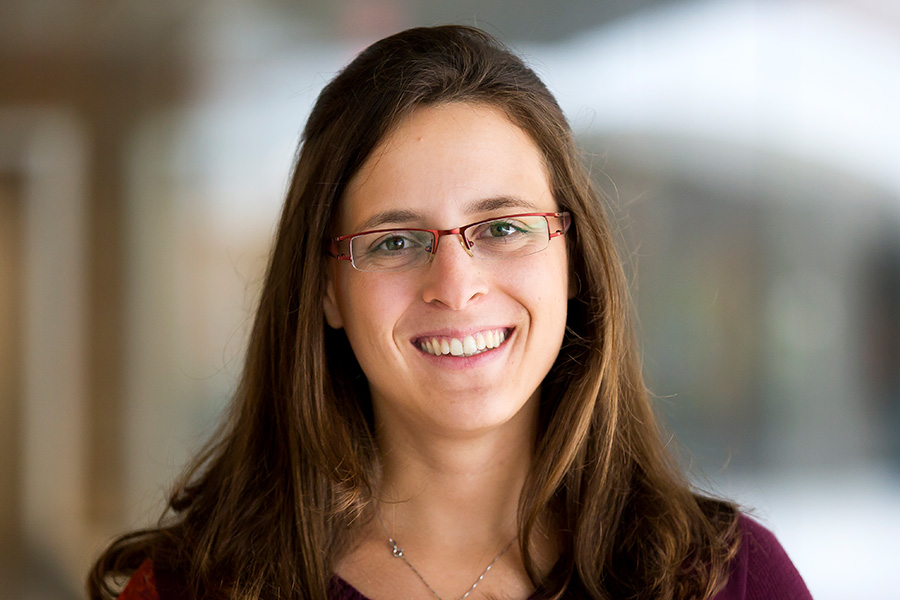CAREER Award for deeper insights into interconnected data: from neurons to web searches
Danai Koutra earned the award for her proposal to innovate the way we use networks to understand the world and speed up our technology.

 Enlarge
Enlarge
Prof. Danai Koutra has earned an NSF CAREER Award for her proposal to innovate the way we use networks to understand the world and speed up our technology. The project, “Timely Insights: Interpretable, Multi-scale Summarization of Networks over Time,” will tackle problems in summarizing networks at different scales to accomplish feats from speeding up web searches to better understanding the structure of the human brain.
How can the evolution of interconnected knowledge about the world be summarized? How does learning affect our brains’ wiring from childhood to early adulthood, or the structure of an artificial neural network over hundreds of training iterations? These questions may seem totally unrelated, but Koutra asserts that they have two things in common: first, they call for modeling or summarizing changes over time, and they involve one or more evolving networks, which naturally capture rich relationships between different types of entities.
Network summarization, which identifies structure and meaning in big data, so far has mostly focused on non-complex, static data. Koutra’s proposal aims to bridge the gap between network summarization research and real-world problems by summarizing networks that change over time, broadening the fields and applications this area of research can impact.
The first major application of her techniques is speeding up and personalizing web search by summarizing the world of information on the web to a smaller graph that can be stored on the user’s device. This constantly-evolving, personalized knowledge base identifies information that’s most relevant to the user’s changing interests. Called knowledge graphs, these collections of nodes and edges store entities, concepts, and their relationships as a means to navigate large amounts of data. This representation is intuitive for making search queries and inferring knowledge, since these tasks require a way to view the connections between different concepts and things. In a way, it’s a very rudimentary digital brain.
A personalized knowledge graph stored right on the user’s device, such as their smartphone, would mean both a huge performance boost and better personalization when interacting with different web services. Searches, voice assistant responses, and other tools would draw from a compact database of the user’s interests over time in order to produce more meaningful results faster. Koutra and her collaborators believe the next frontier of graph summarization lies in personalized and incrementally adaptive techniques. Their future work in this direction will be a step toward efficient information access and knowledge discovery for all users, regardless of location or online connectivity.
The group will also undertake a brand new branch of network summarization research. Using data gathered from fMRI scans of patients’ brains over time, Koutra’s group will work to summarize the brains into a single, representative graph of their development. Viewed individually, each brain scan is essentially a network of neurons and their connections. By summarizing the changes to these networks as each patient ages and develops, Koutra says the group can describe different developmental categories.
For example, finding similarities in brains that develop normally could give researchers a reference model of a healthy brain. Comparing this model to patients with developmental disorders would lead to a number of insights and make the fMRI an even more powerful diagnostic tool.
Finally, Koutra intends to extend this developmental insight to artificial neural networks, which could give machine learning researchers a new way to assess the effectiveness of different learning models.
Koutra received the 2016 ACM SIGKDD Dissertation Award for her thesis on “Exploring and Making Sense of Large Graphs”, an honorable mention for the SCS Doctoral Dissertation Award (CMU), an ARO Young Investigator Award (2018), an Adobe Data Science Research Faculty Award (2018), an Amazon Research Faculty Award (2019), a WSDM 2019 Outstanding PC Award (2019), and has several best paper awards and nominations. Related to this project, she has authored a book with Morgan & Claypool Publishers on scalable methods for individual and collective graph exploration (2017), as well as an ACM Surveys article on graph summarization methods and applications (2018).
About the NSF CAREER Award
The CAREER grant is one of the National Science Foundation’s most prestigious awards, conferred for “the early career-development activities of those teacher-scholars who most effectively integrate research and education within the context of the mission of their organization.”

 MENU
MENU 
